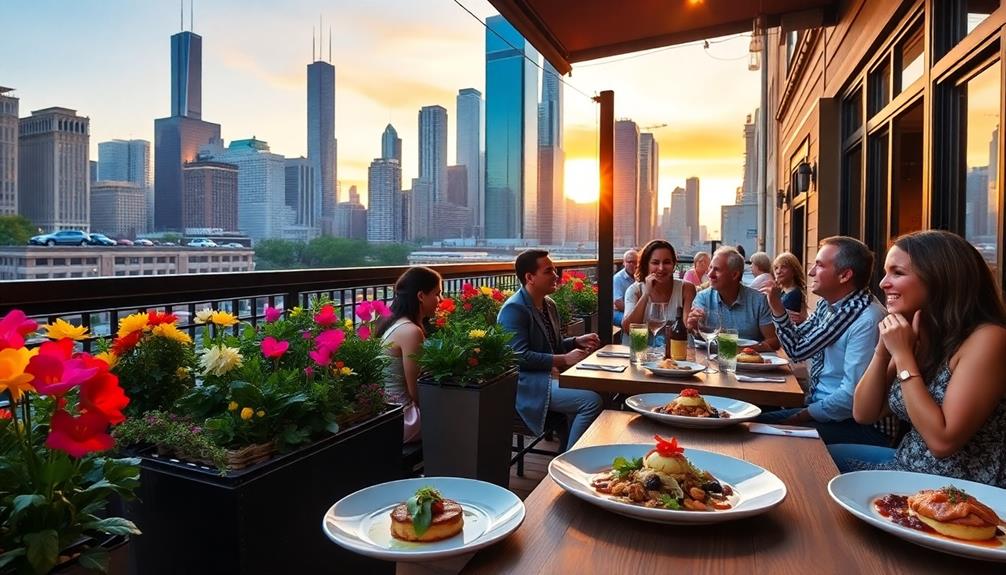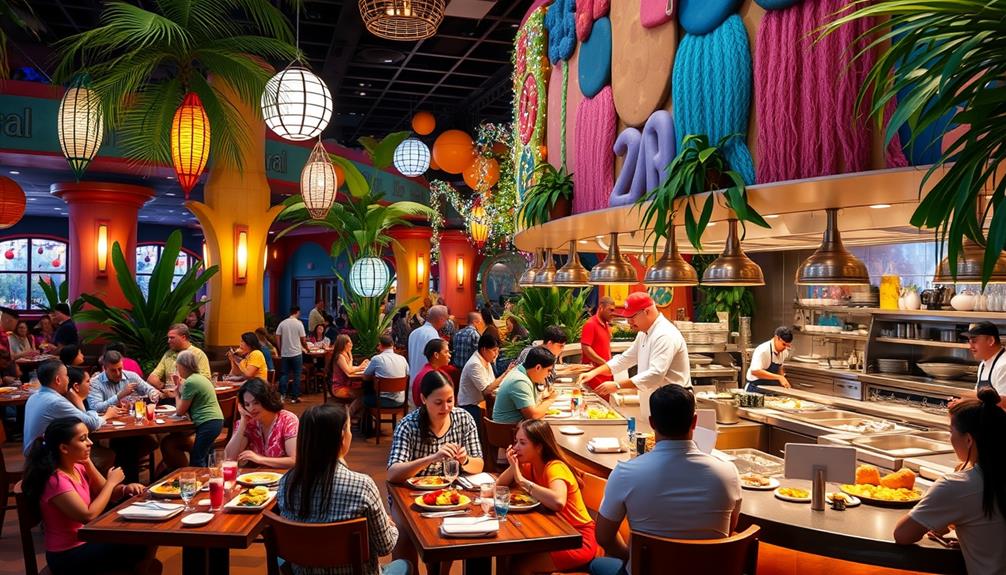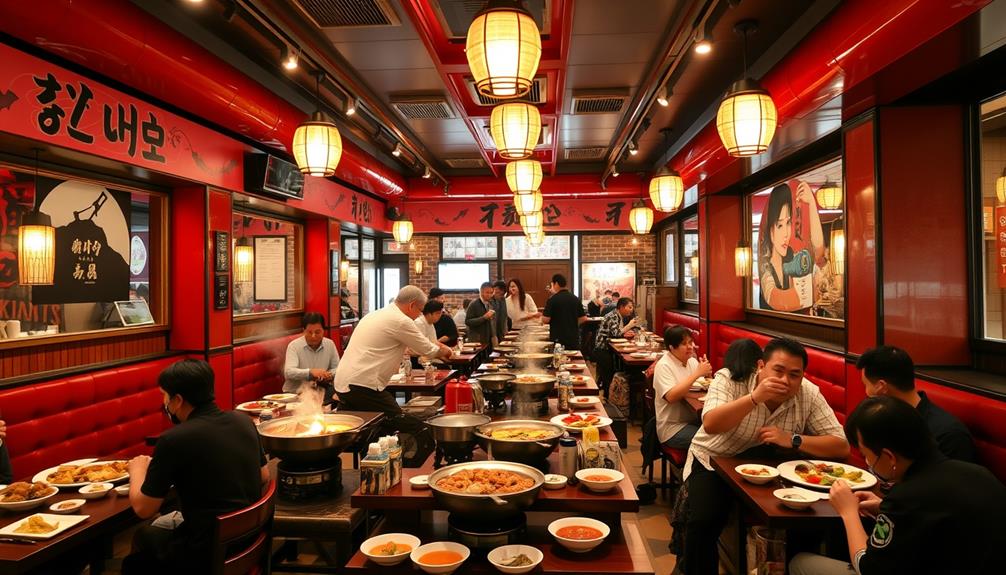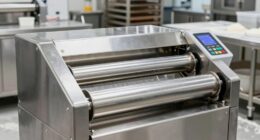When interviewing restaurant employees, focus on questions that reveal their skills and experiences. Start with "Tell me about yourself" to assess background and fit. Ask about previous roles to gauge their customer service abilities. Behavioral questions like "Describe a difficult situation" or "How would you handle a customer complaint?" can show problem-solving skills. Consider their understanding of your restaurant culture with "Why do you want to work here?" Situational questions help determine how they'd handle real-life challenges. Highlighting their strengths and weaknesses will also provide insight into their potential. There's even more valuable information to explore! For example, ask about their experience in a fast-paced environment to see how they handle high-pressure situations. Inquiring about their familiarity with food safety and hygiene protocols is crucial in maintaining a clean and safe kitchen. Additionally, take the opportunity to learn about their experience at other top fast food workplaces to see how their skills and knowledge could benefit your restaurant. These questions will help ensure that you’re hiring the best fit for your team.
Key Takeaways
- Ask about previous restaurant experience to gauge familiarity with operations and customer service expectations.
- Use behavioral questions to assess problem-solving skills and ability to handle difficult situations.
- Inquire about availability to ensure scheduling flexibility and commitment to the role.
- Explore candidates' knowledge of the restaurant's values and culture to assess alignment with the team.
- Assess multitasking skills by discussing techniques for managing busy shifts and high-pressure environments.
Common Interview Questions

When preparing for a restaurant job interview, it's essential to anticipate the common interview questions you'll face. One key question is, "Tell me about yourself." This aids the interviewer in gauging your background and how well you fit the role. One way to best answer this question is to highlight any relevant experience or skills that make you a strong candidate for the job. Another common question is, “Why do you want to work in the restaurant industry?” Be sure to express your passion for customer service and your interest in working in a fast-paced environment. Additionally, mentioning a desire to work for one of the top fast food restaurants to work for, such as Chick-fil-A or In-N-Out Burger, can help demonstrate your enthusiasm for the industry.
Be ready to discuss your previous restaurant experience, focusing on any relevant roles you've held and how they shaped your customer service skills. Additionally, illustrating your financial awareness can show your ability to manage tips and earnings responsibly, which is critical in a restaurant setting.
Another important question revolves around your availability. Interviewers want to understand your scheduling flexibility and commitment to the restaurant's needs.
You should also expect behavioral questions like, "Describe a difficult situation you've handled." This assesses your problem-solving skills and ability to manage customer interactions effectively.
When asked, "Why do you want to work here?" seize the opportunity to show your knowledge of the restaurant's values, culture, and reputation. This indicates your genuine interest in the position and your alignment with their mission.
Lastly, showcasing your work ethic and ability to be a team player can set you apart. Be prepared to illustrate how your skills and experiences make you a strong candidate for the role in this competitive environment.
Unique Interview Questions

While common interview questions help gauge basic qualifications, unique interview questions can provide deeper insights into your problem-solving abilities and creativity.
These questions often explore how you handle challenging situations, particularly in high-pressure environments typical of the restaurant industry. Understanding how to navigate complex interpersonal dynamics is vital, much like the emotional impact of divorce proceedings can affect individuals.
Here are three unique interview questions that can reveal a lot about you:
- If a customer complains about their meal, how would you handle the situation? This assesses your customer service and problem-solving skills, showing how you prioritize customer satisfaction.
- What dish would you create for our menu and why? This question gauges your creativity and understanding of the restaurant's culinary style, highlighting your passion for food and innovation.
- Share a time when you turned a difficult situation into a positive outcome. This allows you to demonstrate your conflict resolution and adaptability, showcasing how you manage expectations and maintain motivation during tough times.
Behavioral-Based Questions

Behavioral-based interview questions frequently focus on your past experiences to predict how you'll behave in similar situations within a restaurant environment. These questions are essential, as they provide insight into your skills and decision-making processes, especially regarding customer service. For example, you might be asked how you've handled difficult customers or worked under pressure. Your responses help assess your interpersonal and problem-solving abilities.
Additionally, just as important oils like eucalyptus oil can provide relief in stressful situations, your ability to manage pressure will be evaluated during these interviews.
Using the STAR method (Situation, Task, Action, Result) is a great way to structure your answers. This approach allows you to clearly illustrate your past experiences, showcasing your adaptability and teamwork. When you share specific anecdotes, you can demonstrate your commitment to excellent customer service, which is critical in any restaurant setting.
Behavioral-based interview questions not only reveal your skills but also help interviewers understand if you align with the restaurant's values and culture. By exploring your motivations and actions in real-life scenarios, these questions highlight how you approach challenges, ensuring that you're a good fit for the team and the environment.
Situational Questions
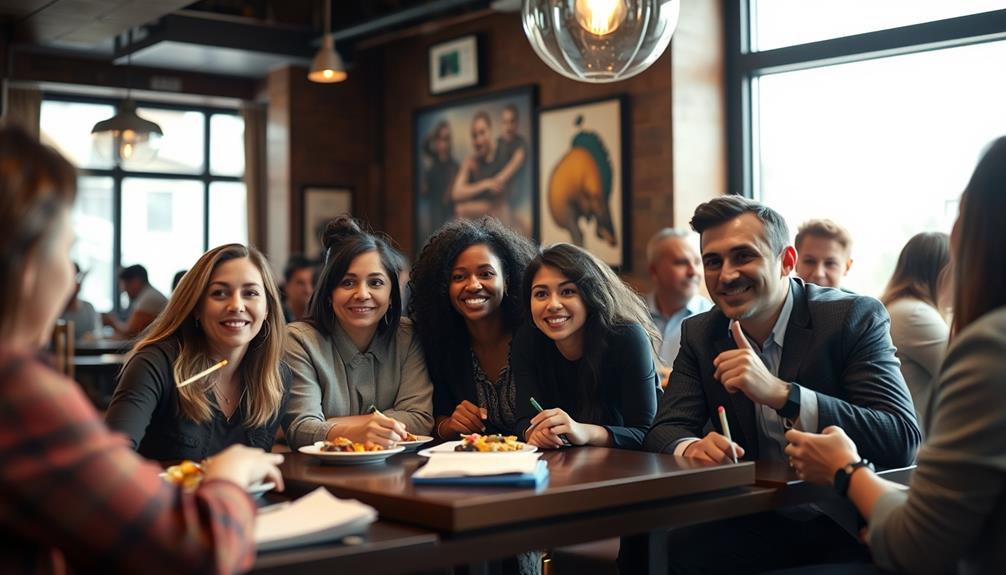
Situational questions are a crucial part of restaurant interviews, focusing on how you'd handle real-life challenges in the workplace.
These questions assess your problem-solving skills and your ability to manage difficult customers or high-pressure situations. When faced with these scenarios, it's important to demonstrate effective communication and conflict resolution strategies.
Here are three key aspects to keep in mind when responding to situational questions:
- Stay Calm Under Pressure: Interviewers want to see how you maintain composure in stressful situations, like dealing with an unhappy customer during a busy service.
- Utilize the STAR Method: Structure your answers using the Situation, Task, Action, Result framework. This helps you clearly articulate your experiences and showcases your problem-solving abilities.
- Align with Team Values: Your responses should reflect how your values fit within the restaurant's service philosophy and team environment.
Highlight how you prioritize customer satisfaction while also supporting your colleagues.
Skills and Experience Questions

When it comes to evaluating candidates for restaurant positions, asking targeted skills and experience questions is essential. Start by delving into their previous roles, as this sheds light on their familiarity with restaurant operations and customer service expectations.
Inquire about relevant training or certifications, like food handling or customer service courses; this helps gauge their commitment to professional development.
Next, ask candidates to describe their greatest strengths and weaknesses related to restaurant work. This provides insight into their self-awareness and potential for growth.
Request examples of past experiences with customer interactions, especially challenging situations, to evaluate their problem-solving abilities and adaptability in high-pressure environments.
You'll also want to explore their techniques for managing tasks during busy shifts. This can reveal their multitasking skills and ability to prioritize under stress.
Finally, encourage candidates to share their experiences working in teams and how they handle feedback. This information will help you assess their teamwork capabilities and overall fit for your restaurant.
Frequently Asked Questions
What Are the Most Asked Questions in a Waitress Interview?
In a waitress interview, you'll likely get asked about your past restaurant experience, how you handle difficult guests, your availability, stress management strategies, and why you want to join the team. Be prepared to share your experiences.
Why Should We Hire You in a Restaurant?
You should hire me because I bring strong customer service skills, a genuine passion for the food industry, and a proven ability to enhance dining experiences. I'm flexible, reliable, and committed to your team's success.
What Should I Say in a Restaurant Interview?
In a restaurant interview, share your relevant experience and accomplishments. Highlight your customer service skills, explain why you admire the restaurant, and demonstrate your problem-solving abilities, especially in challenging situations. Show enthusiasm and flexibility in your availability.
What Are 5 Interview Questions That You Would Ask a Candidate Applying for a Cook Position?
Imagine asking a cook if they've ever burned water. Now, you'd ask about their cooking experience, food safety knowledge, high-pressure handling, adaptability with recipes, and teamwork skills. You want the best for your kitchen!
Conclusion
In the bustling world of restaurants, asking the right questions is like seasoning a dish—just the right blend can bring out the best flavors. By mixing common, unique, and behavioral questions, you'll uncover candidates who not only have the skills but also fit your team's vibe. Remember, each interview is a step toward creating a culinary masterpiece, so choose wisely and watch your restaurant thrive with the perfect blend of talent and passion.


